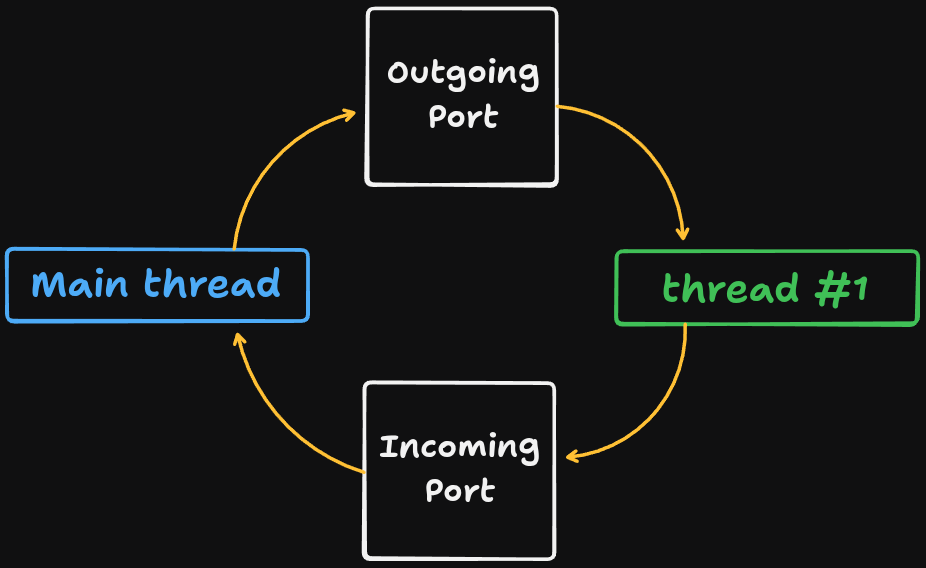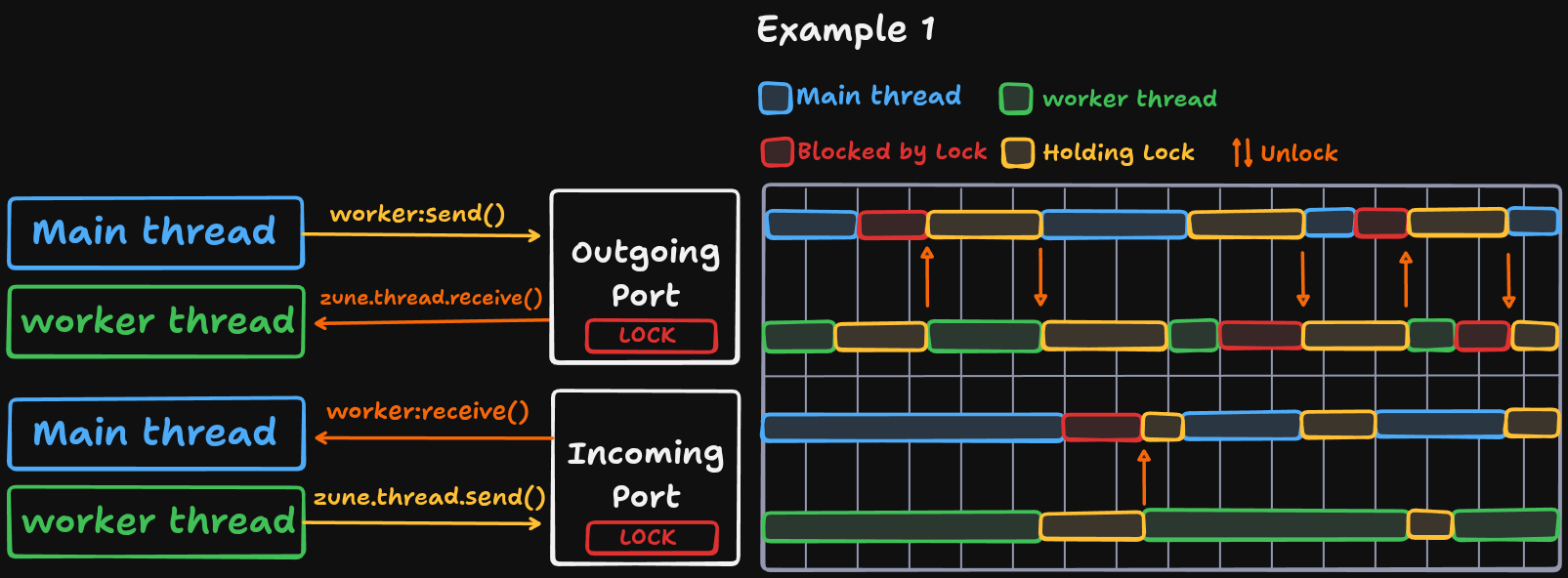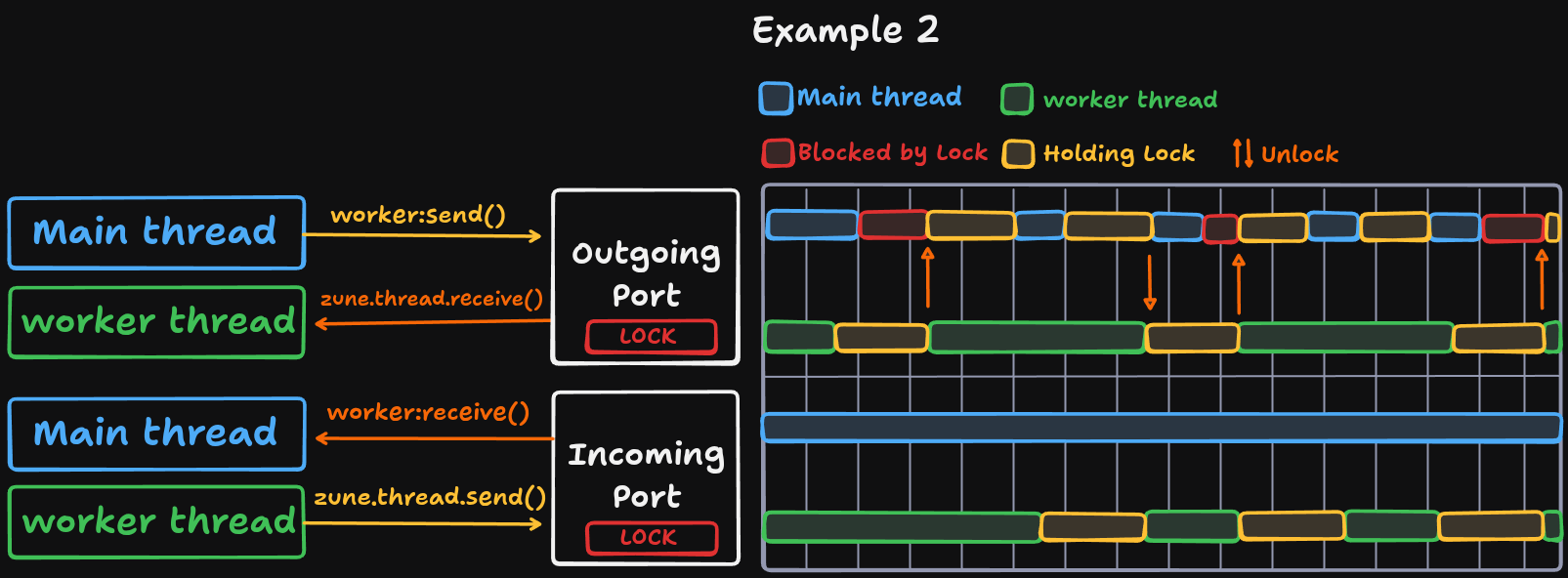Faster Multi-threading
Guide by Sythivo.0.5.*Multi-threading in zune is a powerful feature that allows you to run multiple tasks concurrently, improving performance and responsiveness. This guide will help you set up and optimize multi-threading in your zune projects.
Below is a diagram on how the runtime manages messages between threads; the outgoing and incoming “ports” are basically like tunnels. Internally, it’s just a queue with mutex locks.

Slow example
Here is a simple example of a multi-threading usage in zune
Ideally, this is useful for just sending data and getting it back, but if you can make your program send data in bulk, that kind of usage could be much faster than the example below.
local worker = zune.thread.fromModule("./worker")
worker:start()
for i = 1, 10 do
worker:send(i)
local result = worker:receive()
print(result)
end
worker:join()local thread = zune.thread
for i = 1, 10 do
local result = thread.receive()
print(result)
thread.send(result * 20)
end the graph is only a sample and may not be accurate
the graph is only a sample and may not be accurate
(Showing ~3 iterations on the first main loop)
Not a very accurate graph, but it should show the lock friction, causing less work to be done in parallel, since most of the lock is held by either thread, and either “port” would have high friction, leading to the other “port” rarely being used.
This alone would cause higher delays, where the lines are much longer, as illustrated in the graph above.
There would be too much friction in this example; the runtime would try to obtain a lock while a thread could be holding that lock.
Also, if the data is not available, the receiver end would yield until a signal is sent.
This would cause too much overhead.
Fast example
Here is a more optimized example of multi-threading in zune. This is much faster than the previous example, as the main thread sends data in “bulk”, and doesn’t wait immediately after sending.
The worker thread remains unchanged; the only difference is the main thread.
Reducing lock friction and yielding, because as the data exists in the “ports”, the function call does not need to yield.
local worker = zune.thread.fromModule("./worker")
worker:start()
for i = 1, 10 do
worker:send(i)
end
for i = 1, 10 do
local result = worker:receive()
print(result)
end
worker:join()local thread = zune.thread
for i = 1, 10 do
local result = thread.receive()
print(result)
thread.send(result * 20)
end the graph is only a sample and may not be accurate
the graph is only a sample and may not be accurate
(Showing ~4 iterations on the first main loop)
In this graph, more data is sent on the incoming port from the worker, and more data is sent to the worker on the outgoing port,
hitting less lock friction, as the main thread rarely uses the incoming port.
This example would be much faster, as the main thread would not obtain a lock for the incoming port,
Although there is some friction on the outgoing port, it is much less than in the previous example.
The difference is fewer blocked locks and less yielding.
By the time the main thread receives all data from the incoming port, it should already be available; thus, it should not yield.
Another possible faster version could be this example, where after sending all data, the main thread would start the worker, and immediately join the worker thread. Once the thread has completed processing the data, the main thread can receive it immediately.
local worker = zune.thread.fromModule("./worker")
for i = 1, 10 do
worker:send(i)
end
worker:start()
worker:join()
for i = 1, 10 do
local result = worker:receive()
print(result)
end